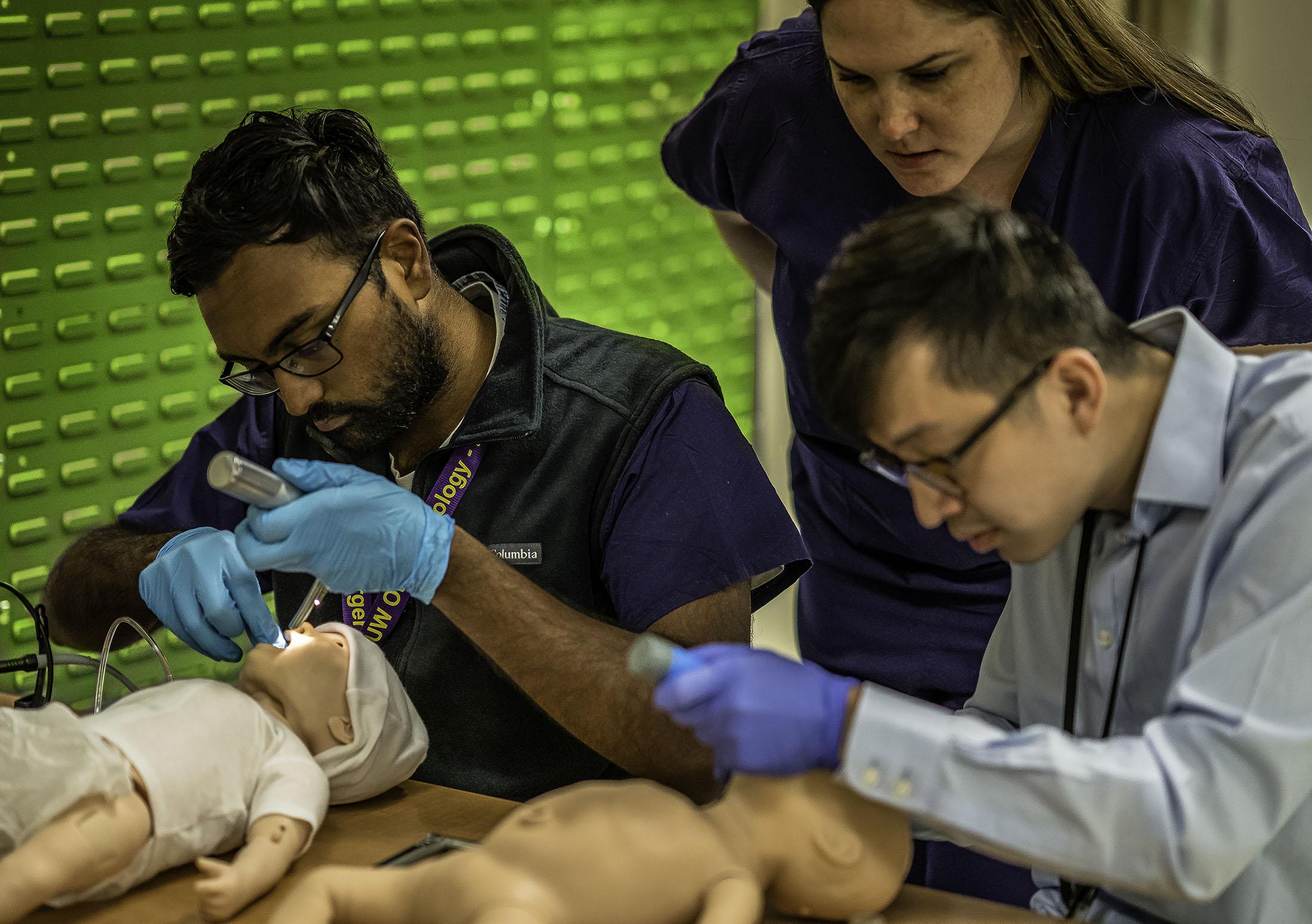Struggling to Hear Clearly? Time to Consult a Hearing Expert
Struggling to Hear Clearly? Time to Consult a Hearing Expert
Blog Article
Discovering the Field of Otolaryngology: What to Expect When You Speak With an ENT
Otolaryngology, frequently referred to as ENT, encompasses the medical diagnosis and therapy of ear, nose, and throat disorders. For those experiencing associated issues, seeking advice from an ENT expert can offer clearness and relief. Comprehending what to anticipate during such assessments is important for effective communication and treatment. This overview will detail vital elements of the ENT experience, consisting of common reasons for visits and the procedures associated with diagnosis and therapy.

Understanding Otolaryngology: A Summary
Otolaryngology, typically described as ENT (Throat, ear, and nose) medication, is a customized branch of medication that concentrates on the medical diagnosis and treatment of conditions influencing these essential locations of the human body. This field encompasses a wide variety of conditions, including those associated to hearing, balance, breathing feature, and speech. Otolaryngologists are trained to handle both clinical and medical treatments, using sophisticated techniques and technologies. Their knowledge extends past typical disorders, attending to problems such as allergies, sinus infections, and hearing loss. Furthermore, they play an essential role in the monitoring of head and neck cancers cells, providing comprehensive care tailored to private client demands. Overall, otolaryngology remains vital for preserving health and wellness and lifestyle in damaged people.
Usual Reasons to See an ENT Expert
Many people look for the experience of an ENT expert for a range of reasons, reflecting the varied nature of problems that influence the ear, nose, and throat. Typical concerns include persistent sinusitis, which typically causes consistent nasal congestion and face discomfort. Allergic reactions and their linked signs, such as sneezing and itching, additionally prompt brows through to these professionals (Sinus). Hearing loss, whether progressive or unexpected, is one more significant reason for appointment. In addition, people may look for evaluation for throat problems, including consistent hoarseness or ingesting problems. Rest apnea, identified by disrupted breathing throughout rest, is often attended to by ENT professionals too. Each of these conditions highlights the value of specialized care in managing complex ENT-related wellness concerns
Planning for Your ENT Visit
When getting ready for an ENT visit, it is necessary to gather appropriate details and take into consideration any details issues. Clients must compile a detailed clinical background, consisting of previous ear, nose, or throat problems, surgical treatments, and current medicines. Recording symptoms-- such as regularity, period, and extent-- can provide useful understandings for the ENT specialist. Additionally, people need to prepare a listing of concerns they desire to ask, ensuring that all issues are attended to throughout the see. Bringing along any type of pertinent clinical documents or examination outcomes can further assist the ENT in recognizing the client's problem. Individuals need to confirm their consultation details, including time, place, and date, to minimize any type of final complication. Proper preparation can improve the effectiveness of the examination and lead to much better outcomes.
What to Expect During the Appointment
As the examination begins, the patient can anticipate to take part in a comprehensive conversation with the ENT expert about their signs and medical history. The specialist will certainly make inquiries regarding the duration, frequency, and severity of signs and symptoms such as hearing loss, nasal congestion, or sore throat. Additionally, the person's previous clinical problems, medications, and any type of relevant family history will certainly be assessed, aiding the professional in developing a total understanding of the client's wellness. The ENT might additionally inquire about lifestyle factors, such as exposure to allergens or irritants. This open dialogue establishes a foundation for the appointment, ensuring that the individual's worries are attended to and establishing the phase for any necessary analyses or recommendations for therapy.
Diagnostic Tests and Procedures in Otolaryngology
A variety of diagnostic examinations and treatments are crucial in otolaryngology to precisely examine and identify problems affecting the throat, nose, and ear. Common tests include audiometry, which gauges hearing function, and tympanometry, examining middle ear pressure. Nasal endoscopy allows visualization of the nasal flows and sinuses, while laryngoscopy checks out the throat and singing cords. Imaging techniques, such as CT scans and MRIs, provide detailed sights of head and neck structures. Allergy screening might also be carried out to identify triggers for sinus or respiratory issues. These analysis devices allow ENT professionals to develop a detailed understanding of individuals' conditions, making certain tailored and reliable monitoring plans. Proper diagnosis is vital for successful therapy outcomes in otolaryngology.
Treatment Choices Provided by ENT Specialists
ENT specialists use a range of treatment choices tailored to address certain problems influencing the throat, nose, and ear. These therapies vary from conventional methods, such as medication and way of life modifications, to even more intrusive procedures. For circumstances, allergies may be taken care of with antihistamines or immunotherapy, while chronic sinus problems might need nasal corticosteroids or sinus surgical procedure. For hearing loss, ENT specialists usually recommend listening device or medical treatments like cochlear implants. In situations of throat problems, choices can include speech treatment or surgeries to eliminate obstructions. Furthermore, they may offer advice for managing sleep apnea, consisting of making use of CPAP gadgets or surgical treatments. Overall, the objective is to improve clients' high quality of life with customized care and reliable therapy strategies.
When to Look For Follow-Up Care With an ENT
When to seek follow-up treatment with an ENT expert is important for handling ongoing symptoms or problems connected to throat, nose, and ear conditions, acknowledging. Clients ought to take into consideration arranging a follow-up consultation if signs and symptoms linger in spite of preliminary treatment, such as chronic ear pain, nasal blockage, or throat pain. Modifications in hearing, balance problems, or uncommon nasal discharge may additionally call for additional examination. Furthermore, if a client experiences negative effects from prescribed medications or has gone through a medical treatment, follow-up care is necessary to check recovery and attend to any worries. Timely appointments can assure efficient management of conditions, prevent potential issues, and offer comfort pertaining to one's health. Looking for follow-up care advertises aggressive health monitoring in otolaryngology.
Often Asked Inquiries

What Credentials Should I Look for in an ENT Expert?
When seeking an ENT expert, one must seek board qualification, relevant experience, and strong patient evaluations. In addition, effective interaction abilities and a thoughtful technique can greatly improve the general treatment experience.
How Do I Pick the Right ENT for My Demands?
Picking the best ENT specialist entails reviewing their certifications, experience, and person reviews (ENT surgery). It is important to consider their interaction style and technique to treatment, guaranteeing they straighten with the individual's particular wellness requirements and choices
Are There Any Threats Related To ENT Procedures?
The dangers related to ENT procedures may consist of infection, blood loss, anesthesia difficulties, and potential damage to surrounding frameworks. Clients must talk about these risks with their medical professional to understand individual problems and assurance notified decisions.
Just How Can I Manage Stress And Anxiety Before My ENT Visit?
To handle stress and anxiety before a visit, individuals can practice deep breathing workouts, visualize positive outcomes, prepare questions beforehand, and seek support from friends or family members, fostering a feeling of reassurance and peace.
What Should I Do if I Experience Adverse Effects From Treatment?
The individual must promptly report them to their healthcare get more info copyright if side impacts from treatment happen. Modifications to treatment or added interventions might be needed to ensure security and performance in managing their condition - Voice. As the assessment begins, the client can expect to involve in a complete discussion with the ENT professional about their signs and symptoms and medical background. These diagnostic tools enable ENT experts to create an extensive understanding of people' conditions, making certain customized and reliable monitoring plans. ENT professionals supply a variety of therapy options tailored to resolve particular problems affecting the ear, nose, and throat. When seeking an ENT professional, one ought to look for board certification, appropriate experience, and strong patient testimonials. Selecting the appropriate ENT professional entails reviewing their certifications, experience, and patient reviews
Report this page